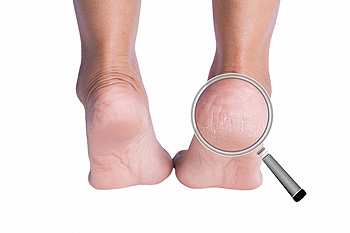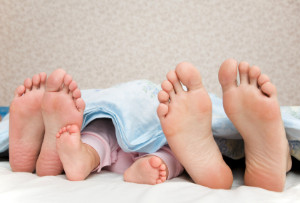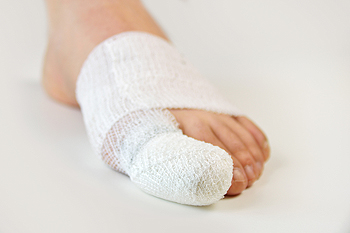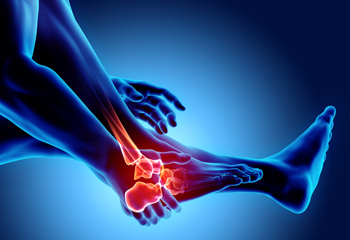How Heel Pain Can Develop
 Many people across the globe suffer from heel pain. It can occur from a variety of foot conditions, including plantar fasciitis, arthritis, or possibly from an Achilles tendon injury. There are patients who develop heel spurs, and the symptoms are often similar to those of plantar fasciitis, which can consist of heel pain in the morning after arising. If an injury has occurred, it may also result in a heel fracture. Common symptoms of this type of heel condition can include swelling, excessive pain, difficulty walking. There are many methods of treating heel pain, and it is strongly suggested that you consult with a podiatrist who can determine what the best healing technique is for you.
Many people across the globe suffer from heel pain. It can occur from a variety of foot conditions, including plantar fasciitis, arthritis, or possibly from an Achilles tendon injury. There are patients who develop heel spurs, and the symptoms are often similar to those of plantar fasciitis, which can consist of heel pain in the morning after arising. If an injury has occurred, it may also result in a heel fracture. Common symptoms of this type of heel condition can include swelling, excessive pain, difficulty walking. There are many methods of treating heel pain, and it is strongly suggested that you consult with a podiatrist who can determine what the best healing technique is for you.
Many people suffer from bouts of heel pain. For more information, contact Donald Manger, DPM of Associated Podiatric Physicians, PA. Our doctor can provide the care you need to keep you pain-free and on your feet.
Causes of Heel Pain
Heel pain is often associated with plantar fasciitis. The plantar fascia is a band of tissues that extends along the bottom of the foot. A rip or tear in this ligament can cause inflammation of the tissue.
Achilles tendonitis is another cause of heel pain. Inflammation of the Achilles tendon will cause pain from fractures and muscle tearing. Lack of flexibility is also another symptom.
Heel spurs are another cause of pain. When the tissues of the plantar fascia undergo a great deal of stress, it can lead to ligament separation from the heel bone, causing heel spurs.
Why Might Heel Pain Occur?
- Wearing ill-fitting shoes
- Wearing non-supportive shoes
- Weight change
- Excessive running
Treatments
Heel pain should be treated as soon as possible for immediate results. Keeping your feet in a stress-free environment will help. If you suffer from Achilles tendonitis or plantar fasciitis, applying ice will reduce the swelling. Stretching before an exercise like running will help the muscles. Using all these tips will help make heel pain a condition of the past.
If you have any questions please contact our office located in Hamilton Township, NJ . We offer the newest diagnostic and treatment technologies for all your foot and ankle needs.
Lack of Vitamins May Lead to Cracked Heels
 The medical condition known as cracked heels is often uncomfortable and unsightly. It can develop as a result of wearing shoes that have an open or from standing on hard surfaces for the majority of the day. Additionally, many people do not take care of their feet properly and their everyday diet may lack essential vitamins and minerals which can be beneficial in keeping the feet healthy. Having a thyroid disorder may lead to the development of cracked heels, as well as obesity. Common symptoms that are often associated with cracked heels can consist of inflamed skin surrounding the heels, calluses, and the foot may itch. It can be beneficial to wash and dry the feet thoroughly followed by frequently applying a good moisturizer. This can help to maintain smooth skin and keep it hydrated too. If you would like additional information about how to properly care for cracked heels, please confer with a podiatrist who can help you to manage this condition.
The medical condition known as cracked heels is often uncomfortable and unsightly. It can develop as a result of wearing shoes that have an open or from standing on hard surfaces for the majority of the day. Additionally, many people do not take care of their feet properly and their everyday diet may lack essential vitamins and minerals which can be beneficial in keeping the feet healthy. Having a thyroid disorder may lead to the development of cracked heels, as well as obesity. Common symptoms that are often associated with cracked heels can consist of inflamed skin surrounding the heels, calluses, and the foot may itch. It can be beneficial to wash and dry the feet thoroughly followed by frequently applying a good moisturizer. This can help to maintain smooth skin and keep it hydrated too. If you would like additional information about how to properly care for cracked heels, please confer with a podiatrist who can help you to manage this condition.
If the skin on your feet starts to crack, you may want to see a podiatrist to find treatment. If you have any concerns, contact Donald Manger, DPM from Associated Podiatric Physicians, PA. Our doctor can provide the care you need to keep you pain-free and on your feet.
Cracked Heels
It is important to moisturize your cracked heels in order to prevent pain, bleeding, and infection. The reason cracked heels form is because the skin on the foot is too dry to support the immense pressure placed on them. When the foot expands, the dry skin on the foot begins to split.
Ways to Help Heal Them
- Invest in a good foot cream
- Try Using Petroleum Jelly
- Ease up on Soaps
- Drink Plenty of Water
Ways to Prevent Cracked Heels
- Moisturize After Showering
- Skip a Shower
- Keep Shower Water Lukewarm
- Don’t Scrub Your Feet
If you are unsure how to proceed in treating cracked heels, seek guidance from a podiatrist. Your doctor will help you with any questions or information you may need.
If you have any questions, please feel free to contact our office located in Hamilton Township, NJ . We offer the newest diagnostic and treatment technologies for all your foot care needs.
Contagious Hand, Foot and Mouth Disease
 Excessive blisters on the feet can indicate a condition that is known as hand, foot and mouth disease. It is considered to be a viral infection, and generally affects children ten years and younger. Hand, foot, and mouth disease is a contagious medical condition, and can be passed to other people by coughing, sneezing, or from the fluid that is inside the blisters. Some of the symptoms that are associated with hand, foot and mouth disease can consist of small blisters on the bottom of the feet, and the child can be feverish and tired. Many children can develop a rash, which is generally not itchy. It is beneficial to drink plenty of water daily as this may help to accelerate the healing process. If you notice your child has signs of this condition, it is suggested that you schedule an appointment with a podiatrist who can properly diagnose and offer correct treatment techniques.
Excessive blisters on the feet can indicate a condition that is known as hand, foot and mouth disease. It is considered to be a viral infection, and generally affects children ten years and younger. Hand, foot, and mouth disease is a contagious medical condition, and can be passed to other people by coughing, sneezing, or from the fluid that is inside the blisters. Some of the symptoms that are associated with hand, foot and mouth disease can consist of small blisters on the bottom of the feet, and the child can be feverish and tired. Many children can develop a rash, which is generally not itchy. It is beneficial to drink plenty of water daily as this may help to accelerate the healing process. If you notice your child has signs of this condition, it is suggested that you schedule an appointment with a podiatrist who can properly diagnose and offer correct treatment techniques.
Making sure that your children maintain good foot health is very important as they grow. If you have any questions, contact Donald Manger, DPM of Associated Podiatric Physicians, PA. Our doctor can provide the care you need to keep you pain-free and on your feet.
Keeping Children's Feet Healthy
Having healthy feet during childhood can help prevent medical problems later in life, namely in the back and legs. As children grow, their feet require different types of care. Here are some things to consider...
Although babies do not walk yet, it is still very important to take care of their feet.
Avoid putting tight shoes or socks on his or her feet.
Allow the baby to stretch and kick his or her feet to feel comfortable.
As a toddler, kids are now on the move and begin to develop differently. At this age, toddlers are getting a feel for walking, so don’t be alarmed if your toddler is unsteady or ‘walks funny’.
As your child gets older, it is important to teach them how to take care of their feet.
Show them proper hygiene to prevent infections such as fungus.
Be watchful for any pain or injury.
Have all injuries checked by a doctor as soon as possible.
Comfortable, protective shoes should always be worn, especially at play.
If you have any questions please feel free to contact our office located in Hamilton Township, NJ . We offer the newest diagnostic and treatment technologies for all your foot and ankle needs.
When to Consult With a Podiatrist
 The foot is composed of 26 bones along with a variety of joints, tendons, ligaments and muscles. A podiatrist is a doctor that specializes in conditions that impact these structures of the foot as well as the ankle. They can specialize in a variety of specific areas, such as surgery, wound care, sports injuries, and diabetic conditions. Podiatrists can treat a variety of conditions that include (but are not limited to) bunions, heel pain, flat feet, sprains, warts, nail conditions, and corns or calluses. Podiatrists should be consulted when there is severe foot pain, swelling, numbness, an open sore or a sign of infection that lasts multiple days. You should also consult with a podiatrist immediately if the foot or ankle cannot bear any weight.
The foot is composed of 26 bones along with a variety of joints, tendons, ligaments and muscles. A podiatrist is a doctor that specializes in conditions that impact these structures of the foot as well as the ankle. They can specialize in a variety of specific areas, such as surgery, wound care, sports injuries, and diabetic conditions. Podiatrists can treat a variety of conditions that include (but are not limited to) bunions, heel pain, flat feet, sprains, warts, nail conditions, and corns or calluses. Podiatrists should be consulted when there is severe foot pain, swelling, numbness, an open sore or a sign of infection that lasts multiple days. You should also consult with a podiatrist immediately if the foot or ankle cannot bear any weight.
If you are dealing with pain in your feet and ankles, you may want to seek help from a podiatrist. Feel free to contact Donald Manger, DPM from Associated Podiatric Physicians, PA. Our doctor can provide the care you need to keep you pain-free and on your feet.
What Is a Podiatrist?
A podiatrist is a doctor of podiatric medicine who diagnoses and treats conditions of the foot, ankle, and related structures of the leg. Your podiatrist may specialize in a certain field such as sports medicine, wound care, pediatrics, and diabetic care. Podiatrists have the ability to become board certified through training, clinical experience, and then taking an exam.
What Do Podiatrists Do?
On a daily basis, a podiatrist may perform the following activities:
- Diagnose foot ailments such as ulcers, tumors, fractures, etc.
- Use innovative methods to treat conditions
- Use corrective orthotics, casts, and strappings to correct deformities
- Correct walking patterns and balance
- Provide individual consultations to patients
It is very important that you take care of your feet. It’s easy to take having healthy feet for granted, however foot problems tend to be among the most common health conditions. Podiatrists can help diagnose and treat a variety of feet related conditions, so it is crucial that you visit one if you need assistance.
If you have any questions please feel free to contact our office located in Hamilton Township, NJ . We offer the newest diagnostic and treatment technologies for all your foot and ankle needs.
Active and Overweight Children May Develop Sever’s Disease
 The medical term for Sever’s Disease is calcaneal apophysitis. It is an uncomfortable foot condition that can affect active teenagers and children as they reach adolescence. It occurs as a result of different growing speeds of the tendons and growth plate in the heel. This can cause the tendons to become tight, putting stress on the heel. Children who frequently participate in running and jumping activities and young teenagers who are overweight may experience Sever’s disease. Mild relief can be found when the affected foot is elevated, and it may help to relieve swelling on the heel by wearing compression socks. If your child or teen is limping, it is suggested that you schedule a consultation with a podiatrist who can help them find the right treatment options.
The medical term for Sever’s Disease is calcaneal apophysitis. It is an uncomfortable foot condition that can affect active teenagers and children as they reach adolescence. It occurs as a result of different growing speeds of the tendons and growth plate in the heel. This can cause the tendons to become tight, putting stress on the heel. Children who frequently participate in running and jumping activities and young teenagers who are overweight may experience Sever’s disease. Mild relief can be found when the affected foot is elevated, and it may help to relieve swelling on the heel by wearing compression socks. If your child or teen is limping, it is suggested that you schedule a consultation with a podiatrist who can help them find the right treatment options.
Sever's disease often occurs in children and teens. If your child is experiencing foot or ankle pain, see Donald Manger, DPM from Associated Podiatric Physicians, PA. Our doctor can treat your child’s foot and ankle needs.
Sever’s Disease
Sever’s disease is also known as calcaneal apophysitis, which is a medical condition that causes heel pain I none or both feet. The disease is known to affect children between the ages of 8 and 14.
Sever’s disease occurs when part of the child’s heel known as the growth plate (calcaneal epiphysis) is attached to the Achilles tendon. This area can suffer injury when the muscles and tendons of the growing foot do not keep pace with bone growth. Therefore, the constant pain which one experiences at the back of the heel will make the child unable to put any weight on the heel. The child is then forced to walk on their toes.
Symptoms
Acute pain – Pain associated with Sever’s disease is usually felt in the heel when the child engages in physical activity such as walking, jumping and or running.
Highly active – Children who are very active are among the most susceptible in experiencing Sever’s disease, because of the stress and tension placed on their feet.
If you have any questions, please feel free to contact our office located in Hamilton Township, NJ . We offer the newest diagnostic and treatment technologies for all your foot and ankle injuries.
A Relaxed Mind and Strong Body Can Reduce Running Injuries
With the long-term physical and emotional toll injuries can take on a runner, preparing the body and mind can go a long way in preventing injuries from occurring. Regular meditation can help you maintain a relaxed mind so you can stay present and focused on your movements. Breathing exercises can help you dissipate angry or agitated emotions so that you can remove stress and tension in your body to reduce your chances of injury. Strengthen your muscles and stamina gradually with preparation and proper training, and consider joining a running group for support and advice. You can also consult with a podiatrist who can recommend the best type of running shoe and also create custom orthotics that support your individual foot structure and running style. Both of these things can help further reduce your risk of injury.
Exercising your feet regularly with the proper foot wear is a great way to prevent injuries. If you have any concerns about your feet, contact Donald Manger, DPM of Associated Podiatric Physicians, PA. Our doctor will treat your foot and ankle needs.
How to Prevent Running Injuries
Many common running injuries are caused by overuse and overtraining. When the back of the kneecap starts wearing out and starts causing pain in your knee, this is commonly referred to as runner’s knee. Runner’s knee is a decrease in strength in your quadriceps and can occur if you’re not wearing properly fitted or supporting shoes. To prevent runner’s knee, focusing on hip strengthening is a good idea, as well as strengthening your quads to keep the kneecaps aligned.
What Are Some Causes of Running Injuries?
- One cause of a common running injury is called iliotibial band syndrome.
- Plantar fasciitis is also another common injury.
- Stress fractures can occur from overtraining, lack of calcium, or even your running style.
Best Ways to Prevent Running Injuries
- Wear footwear that fits properly and suits your running needs.
- Running shoes are the only protective gear that runners have to safeguard them from injury.
- Make a training schedule. Adding strengthening exercises as well as regular stretching can help keep you strong and limber and can lessen the possibility of injuries.
- Stretching keeps muscles limber; this will help you gain better flexibility.
If you have any questions please feel free to contact our office located in Hamilton Township, NJ . We offer the newest diagnostic and treatment technologies for all your foot and ankle needs.
Symptoms of Diabetic Neuropathy
 Diabetic neuropathy is a common complication of diabetes that causes nerve damage in the hands and feet. Neuropathy tends to develop slowly, sometimes over several decades, so people with diabetes are urged to closely monitor their foot health. The symptoms of diabetic neuropathy include a “pins and needles” sensation in the feet, sensitivity to touch or a loss of touch, pain, numbness, tingling, burning, difficulties with coordination while walking, and muscle weakness. Diabetic neuropathy can be dangerous and lead to serious complications, as the loss of sensation that it causes in the feet can make foot wounds more likely to form. These wounds tend to heal poorly and may become infected. If you have diabetes, a podiatrist can help you maintain the health of your feet.
Diabetic neuropathy is a common complication of diabetes that causes nerve damage in the hands and feet. Neuropathy tends to develop slowly, sometimes over several decades, so people with diabetes are urged to closely monitor their foot health. The symptoms of diabetic neuropathy include a “pins and needles” sensation in the feet, sensitivity to touch or a loss of touch, pain, numbness, tingling, burning, difficulties with coordination while walking, and muscle weakness. Diabetic neuropathy can be dangerous and lead to serious complications, as the loss of sensation that it causes in the feet can make foot wounds more likely to form. These wounds tend to heal poorly and may become infected. If you have diabetes, a podiatrist can help you maintain the health of your feet.
Neuropathy
Neuropathy can be a potentially serious condition, especially if it is left undiagnosed. If you have any concerns that you may be experiencing nerve loss in your feet, consult with Donald Manger, DPM from Associated Podiatric Physicians, PA. Our doctor will assess your condition and provide you with quality foot and ankle treatment for neuropathy.
What Is Neuropathy?
Neuropathy is a condition that leads to damage to the nerves in the body. Peripheral neuropathy, or neuropathy that affects your peripheral nervous system, usually occurs in the feet. Neuropathy can be triggered by a number of different causes. Such causes include diabetes, infections, cancers, disorders, and toxic substances.
Symptoms of Neuropathy Include:
- Numbness
- Sensation loss
- Prickling and tingling sensations
- Throbbing, freezing, burning pains
- Muscle weakness
Those with diabetes are at serious risk due to being unable to feel an ulcer on their feet. Diabetics usually also suffer from poor blood circulation. This can lead to the wound not healing, infections occurring, and the limb may have to be amputated.
Treatment
To treat neuropathy in the foot, podiatrists will first diagnose the cause of the neuropathy. Figuring out the underlying cause of the neuropathy will allow the podiatrist to prescribe the best treatment, whether it be caused by diabetes, toxic substance exposure, infection, etc. If the nerve has not died, then it’s possible that sensation may be able to return to the foot.
Pain medication may be issued for pain. Electrical nerve stimulation can be used to stimulate nerves. If the neuropathy is caused from pressure on the nerves, then surgery may be necessary.
If you have any questions, please feel free to contact our office located in Hamilton Township, NJ . We offer the newest diagnostic and treatment technologies for all your foot care needs.
What to Do if You Have Morton's Neuroma
Morton’s neuroma is a condition in which the nerve tissue located in the ball of the foot, between the toes, becomes inflamed. This causes symptoms such as sharp pain in the bottom of the foot, tingling, burning, numbness, or the sensation that you are walking on a pebble or that something is stuck in the ball of your foot. Morton’s neuroma can often fully resolve with conservative treatments such as resting and icing the foot, wearing wide and comfortable shoes, wearing orthotic inserts, and taking over the counter medications to reduce pain. Your podiatrist can also relieve Morton’s neuroma pain by injecting cortisone directly into the foot. In rare cases, symptoms may be persistent and could require surgical intervention. Consult with a podiatrist to find out which treatment method would be best for you.
Morton’s neuroma is a very uncomfortable condition to live with. If you think you have Morton’s neuroma, contact Donald Manger, DPM of Associated Podiatric Physicians, PA. Our doctor will attend to all of your foot care needs and answer any of your related questions.
Morton’s Neuroma
Morton's neuroma is a painful foot condition that commonly affects the areas between the second and third or third and fourth toe, although other areas of the foot are also susceptible. Morton’s neuroma is caused by an inflamed nerve in the foot that is being squeezed and aggravated by surrounding bones.
What Increases the Chances of Having Morton’s Neuroma?
- Ill-fitting high heels or shoes that add pressure to the toe or foot
- Jogging, running or any sport that involves constant impact to the foot
- Flat feet, bunions, and any other foot deformities
Morton’s neuroma is a very treatable condition. Orthotics and shoe inserts can often be used to alleviate the pain on the forefront of the feet. In more severe cases, corticosteroids can also be prescribed. In order to figure out the best treatment for your neuroma, it’s recommended to seek the care of a podiatrist who can diagnose your condition and provide different treatment options.
If you have any questions, please feel free to contact our office located in Hamilton Township, NJ . We offer the newest diagnostic and treatment technologies for all your foot care needs.
More...
Helping Someone You Love With Arthritis
While it can be difficult to watch someone you care about suffer with rheumatoid arthritis, there are some things you can do that may help them deal with their illness and possibly even reduce pain in their feet and ankles. Try to reduce the swelling in your loved one’s joints with progressive relaxation—a technique where the muscles are tensed and then relaxed, working up from the feet. Their pain from swollen joints can also sometimes be eased by icing them with an ice pack or even a bag of frozen peas which conform to the joint’s shape. Help your loved one choose the right foods to maintain a healthy body weight to reduce the amount of pressure put on the joints of the feet, hips, and knees. You can also schedule an appointment for your loved one with a podiatrist for an exam, and to discuss if doing certain physical activities like tai chi, yoga, aqua therapy, or walking may help to strengthen their muscles and reduce their pain.
Because RA affects more than just your joints, including the joints in your feet and ankles, it is important to seek early diagnosis from your podiatrist if you feel like the pain in your feet might be caused by RA. For more information, contact Donald Manger, DPM of Associated Podiatric Physicians, PA. Our doctor will assist you with all of your podiatric concerns.
What Is Rheumatoid Arthritis?
Rheumatoid Arthritis (RA) is an autoimmune disorder in which the body’s own immune system attacks the membranes surrounding the joints. Inflammation of the lining and eventually the destruction of the joint’s cartilage and bone occur, causing severe pain and immobility.
Rheumatoid Arthritis of the Feet
Although RA usually attacks multiple bones and joints throughout the entire body, almost 90 percent of cases result in pain in the foot or ankle area.
Symptoms
- Swelling and pain in the feet
- Stiffness in the feet
- Pain on the ball or sole of feet
- Joint shift and deformation
Diagnosis
Quick diagnosis of RA in the feet is important so that the podiatrist can treat the area effectively. Your doctor will ask you about your medical history, occupation, and lifestyle to determine the origin of the condition. Rheumatoid Factor tests help to determine if someone is affected by the disease.
If you have any questions please feel free to contact our office located in Hamilton Township, NJ . We offer the newest diagnostic and treatment technologies for all your foot and ankle needs.
Turf Toe Severities
 Turf toe is one of the most common foot injuries among athletes and refers to a sprain of the first metatarsophalangeal (MTP) joint located just below the big toe. When this joint is injured, it also often damages the surrounding ligaments, causing pain when you try to walk, jog, run, or jump. Turf toe can be classified based on how severe the injury is. A mild injury involves minor stretching of one or more ligaments in the MTP joint and is associated with tenderness, discomfort, and mild swelling. A moderate injury involves partial tearing of the ligament or joint capsule and causes pain, swelling, and difficulty walking. A severe injury involves a complete rupture of the ligaments or joint capsule and pain may be severe and make walking impossible. If you have any foot or ankle injuries, please seek the care of a podiatrist.
Turf toe is one of the most common foot injuries among athletes and refers to a sprain of the first metatarsophalangeal (MTP) joint located just below the big toe. When this joint is injured, it also often damages the surrounding ligaments, causing pain when you try to walk, jog, run, or jump. Turf toe can be classified based on how severe the injury is. A mild injury involves minor stretching of one or more ligaments in the MTP joint and is associated with tenderness, discomfort, and mild swelling. A moderate injury involves partial tearing of the ligament or joint capsule and causes pain, swelling, and difficulty walking. A severe injury involves a complete rupture of the ligaments or joint capsule and pain may be severe and make walking impossible. If you have any foot or ankle injuries, please seek the care of a podiatrist.
Sports related foot and ankle injuries require proper treatment before players can go back to their regular routines. For more information, contact Donald Manger, DPM of Associated Podiatric Physicians, PA. Our doctor can provide the care you need to keep you pain-free and on your feet.
Sports Related Foot and Ankle Injuries
Foot and ankle injuries are a common occurrence when it comes to athletes of any sport. While many athletes dismiss the initial aches and pains, the truth is that ignoring potential foot and ankle injuries can lead to serious problems. As athletes continue to place pressure and strain the area further, a mild injury can turn into something as serious as a rupture and may lead to a permanent disability. There are many factors that contribute to sports related foot and ankle injuries, which include failure to warm up properly, not providing support or wearing bad footwear. Common injuries and conditions athletes face, including:
- Plantar Fasciitis
- Plantar Fasciosis
- Achilles Tendinitis
- Achilles Tendon Rupture
- Ankle Sprains
Sports related injuries are commonly treated using the RICE method. This includes rest, applying ice to the injured area, compression and elevating the ankle. More serious sprains and injuries may require surgery, which could include arthroscopic and reconstructive surgery. Rehabilitation and therapy may also be required in order to get any recovering athlete to become fully functional again. Any unusual aches and pains an athlete sustains must be evaluated by a licensed, reputable medical professional.
If you have any questions please feel free to contact our office located in Hamilton Township, NJ . We offer the newest diagnostic and treatment technologies for all your foot and ankle needs.
Why Ankles Are so Important to Mobility
The ankle is a joint that connects the leg to the foot using a series of bones including the fibula, tibia, and the tarsal bones of the foot. The ankle is an integral part of a complex system that continually keeps our bodies balanced when we stand, and aids in our overall mobility. The foot needs the ankle in order to move up and down (dorsiflexion and plantarflexion), side-to-side (inversion and eversion), and to rotate either inward or outward (medially and laterally). Because of how active the ankle is in everyday movements as well as athletic activities, ankle injuries are quite common. Additionally, as we age, ankle mobility declines and makes us more prone to falling and other accidents. If you are experiencing any type of issue with your ankle, contact a podiatrist who can examine you and perform a variety of tests to detect any underlying cause of ankle pain, weakness, or mobility deterioration.
Foot and ankle trauma is common among athletes and the elderly. If you have concerns that you may have experienced trauma to the foot and ankle, consult with Donald Manger, DPM from Associated Podiatric Physicians, PA. Our doctor will assess your condition and provide you with quality foot and ankle treatment.
Foot and ankle trauma cover a range of injuries all over the foot; common injuries include:
- Broken bones
- Muscle strains
- Injuries to the tendons and ligaments
- Stress fractures
Symptoms
Symptoms of foot and ankle injuries vary depending on the injury, but more common ones include:
- Bruising
- Inflammation/ Swelling
- Pain
Diagnosis
To properly diagnose the exact type of injury, podiatrists will conduct a number of different tests. Some of these include sensation and visual tests, X-rays, and MRIs. Medical and family histories will also be taken into account.
Treatment
Once the injury has been diagnosed, the podiatrist can than offer the best treatment options for you. In less severe cases, rest and keeping pressure off the foot may be all that’s necessary. Orthotics, such as a specially made shoes, or immobilization devices, like splints or casts, may be deemed necessary. Finally, if the injury is severe enough, surgery may be necessary.
If you have any questions, please feel free to contact our office located in Hamilton Township, NJ . We offer the newest diagnostic and treatment technologies for all your foot care needs.







